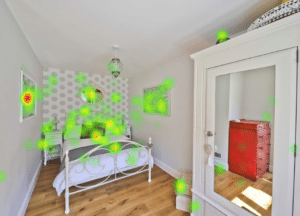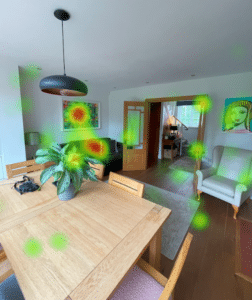
Zoopla has trialled eye-tracking technology to dive deeper into the habits of 2000 British homebuyers who visit a property.
Highlights from the trial include:
Zoopla trialled eye-tracking software during the viewing process to track where home hunters focus their attention during a home viewing.
Findings from the trial indicated that homebuyers spent just 34 seconds looking at a bedroom, and just 1.2 minutes in the kitchen.
Zoopla says that 20% of Brits will make an offer after less than 20 minutes of a live visit; a statistic that the portal says converts to "a £13,280-a-minute decision".

Source: Zoopla.co.uk
More troublingly, the study revealed that homebuyers were focusing more of their time and attention on superficial details like the current furniture in the property—which will inevitably be removed after a purchase—instead of diving deep into the condition of the boiler or checking for signs of damage or damp around the property.
Trial participants were least interested in flooring, the roof and the ceiling.
They also spent less than half a second looking at radiators, despite their importance to the home's heating system.
The same number of participants—25%—admitted snooping on family photos on show, as checking water pressure or wifi strength.

Source: Zoopla.co.uk
Daniel Copley, Consumer Expert at Zoopla, said:
"It has been fascinating to use cutting-edge technology to investigate the behavioural habits of buyers, so that we can equip them and sellers with the information they need to make confident decisions when buying and selling a property. For agents, the experiment provides insights for them on what their clients are really looking at when viewing a property.
"Buying a home is the most expensive purchase most of us will ever make. It’s crucial to make every effort to inspect all elements, in order to save yourself time and money further down the line."
Zoopla rightly prides itself on its provision of data and insights to the industry, from agents to buyers and sellers, and has supplied some fascinating findings from this trial.
The question is, how might a portal, proptech, or real estate agent respond to Zoopla's dataset?
One option is to bulk out listings themselves with information about aspects of a property that typically get overlooked; for example, one line of text to say that the property has never had any problems with damp or condensation—or for agents to go through a checklist of similar prompts for viewers who could be forgiven for not asking important questions.